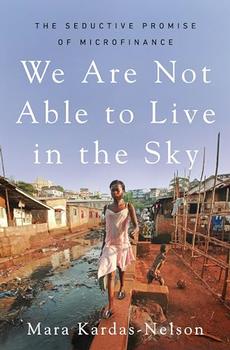
The Seductive Promise of Microfinance
by Mara Kardas-Nelson
A deeply reported work of journalism that explores the promises and perils of microfinance, told through the eyes of those who work in small-scale lending and women borrowers in West Africa
In the mid-1970s, Muhammad Yunus, an American-trained Bangladeshi economist, met a poor female stool maker who needed money to expand her business. In an act known as the beginning of microfinance, Yunus lent $27 to 42 women, hoping small credit would help them to pull themselves out of poverty. Soon, Yunus' Grameen Bank was born, and very small, often high-interest loans for poor people took off. In 2006, Yunus and the Grameen Bank won the Nobel Peace Prize "for…creat[ing] economic and social development from below."
But there's a problem with this story. There are mounting concerns that these small loans are as likely to bury poor people in debt as they are to pull them from poverty, with borrowers from India to Kenya facing consequences such as jail time and forced land sales. Hundreds have even reportedly committed suicide.
What happened? Did microfinance take a wrong turn, or was microfinance flawed from the beginning?
Mara Kardas-Nelson's We Are Not Able to Live in the Sky is a story about unintended consequences, blind optimism, and the decades-long ramifications of seemingly small policy choices, rooted in the stories of women borrowers in Sierra Leone, West Africa; their narratives are set against the rise of Yunus's vision that tiny loans would "put poverty in museums," explored through a deep history of modern international development. Kardas-Nelson asks: What is missed with a single, financially-focused solution to global inequity that ignores the real drivers of poverty? Who stands to benefit and, more important, who gets left behind?
"[An] eye-opening debut exposé ... Kardas-Nelson's crisp characterizations and novelistic storytelling bring clarity to a sprawling, shadowy history. The result is a devastating look at a disaster set into motion by misguided American policymakers." ―Publishers Weekly (starred review)
"A keen examination of the rise and fall in popularity of the microfinance loan system... This thoughtful deep dive into the world of microfinance is both educative and heartbreaking." ―Kirkus Reviews
"Through a dazzling, superbly paced combination of astute history and on-the-ground observation in Sierra Leone, West Africa, Mara Kardas-Nelson holds the claims of microfinance up to the light. I wish that every new idea touted as the solution to the world's problems had such a thoughtful and compassionate examination." ―Adam Hochschild, bestselling author of American Midnight and King Leopold's Ghost
"What happens to money loaned to extremely poor people? Who gains and who loses? In her exhaustively researched tour de force, Mara Kardas-Nelson explodes myths – in some cases, lies – bringing tough truths to microfinancing, high-interest loans, and even the Nobel Prize. We Are Not Able to Live in the Sky should be mandatory reading for everybody looking for solutions to extreme poverty." ―Laurie Garrett, Pulitzer Prize-winning author of Betrayal of Trust: The Collapse of Global Public Health
"By turns a fascinating global history of micro-credit and a haunting account of its effects on a handful of women in Sierra Leone, We Are Not Able to Live in the Sky traces the rise, fall and afterlife of an industry built on neoliberal fantasies, on the preening of powerful poseurs, and on the backs of millions of desperate people." ―James K. Galbraith, The University of Texas at Austin and author of Inequality: What Everyone Needs to Know
This information about We Are Not Able to Live in the Sky was first featured
in "The BookBrowse Review" - BookBrowse's membership magazine, and in our weekly "Publishing This Week" newsletter. Publication information is for the USA, and (unless stated otherwise) represents the first print edition. The reviews are necessarily limited to those that were available to us ahead of publication. If you are the publisher or author and feel that they do not properly reflect the range of media opinion now available, send us a message with the mainstream reviews that you would like to see added.
Any "Author Information" displayed below reflects the author's biography at the time this particular book was published.
Mara Kardas-Nelson is an independent journalist focusing on international development and inequality. Her award-winning work has been supported by the International Women's Media Foundation, Investigative Editors and Reporters, the Richard J. Margolis Award and others and has appeared in the New York Times, the Nation, the Guardian, on NPR, and elsewhere. Mara has also spent years working in global health. Originally from the U.S., she has also lived in Canada, South Africa and Sierra Leone.




Failure is the condiment that gives success its flavor
Click Here to find out who said this, as well as discovering other famous literary quotes!
Your guide toexceptional books
BookBrowse seeks out and recommends the best in contemporary fiction and nonfiction—books that not only engage and entertain but also deepen our understanding of ourselves and the world around us.